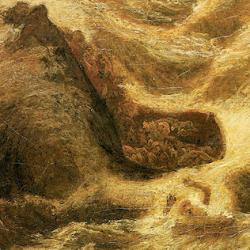A student, David Henry, points out that the word “fish” is used three times in Jonah 1-2, and notes that twice it is masculine ( dag ; 1:17; 2:10) but once in a feminine form ( dagah ; 2:1).
A gender-bending fish? Uncertainty on the part of the writer? Or a thematically significant variation? I choose door #3.
Before Jonah enters the fish, it is masculine (1:17); when he is within the fish, it is feminine (2:1); when it expels him onto dry land, it is masculine again (2:10). Jonah’s presence turns the fish (grammatically, literarily) feminine. She turns mother, and he turns fetus; his return to dry land is his new birth. That possibility is supported by the use of me’eh for the “belly” of the fish, a word that frequently means “womb” (Genesis 25:23; Ruth 1:11; Psalm 71:6) and when used of men refers to their generative power (Genesis 15:4; 2 Samuel 7:12; 16:11).
Then we allegorize: The fish is a ruler of the Gentile sea, Jonah a representative Israelite. Jonah in the feminine fish promises that the Gentile world will turn fruitful when the seed of Abraham is planted in her belly.
Then we allegorize again: Jesus is Jonah, the grave the belly of the fish. And Jesus the greater Jonah turns the devouring masculine grave into a fruitful womb, a mother of children.











